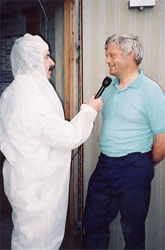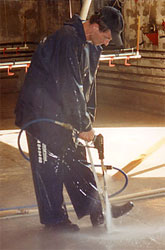To see how Danish farmers are coping, we drive down a country road past wheat fields and cattle and farmhouses with thatched roofs.
 |    |  |
 |
 |
 |
 |  |  |
 |
Reporter Daniel Zwerdling dons a disposable body suit before entering Biara's chicken house.
Click photo to enlarge
Photo: Daniel Zwerdling |
 |
 |    |  |
"My name is Biara. I hope you will enjoy your stay here, and just ask me if you want to know something about my way of raising broilers."
Biara has got an impish smile, silver hair, and really blue eyes. He says when the meat industry suddenly told him to stop using antibiotics, he was scared he'd go out of business.
But Biara says he's learned the secret of how to raise animals a more natural way. You have to take great care of them. For instance, it's harder to visit Biara's chicken house than the intensive care ward in a hospital. He raises his chickens, 45,000 chickens, in a huge brick shed that's longer than a football field. No windows. Before we step foot across the threshold, we have to put on disposable body suits with hoods. Then we have to lift each foot in the air and balance as we pull on a long, plastic boot, and then we carefully place that foot inside the doorway without ever brushing the ground outside. Biara's not protecting us; he's protecting his birds.
"I'm afraid you have some bacteria on you," he says. "Perhaps on your clothes. At least we don't want to take any risk that you'll bring bacteria inside my house."
At this point, we still can't get next to the chickens. He'll only let us view them through a sealed window. Some researchers in Europe and the U.S. say that antibiotics are like a crutch. They basically cover up a farmer's mistakes and they work best in animals that aren't perfectly healthy.
So Biara says he has to be meticulous. "First of all, we have the computer taking care of everything. It's connecting the feed barrel to the water."
 |    |  |
 |
 |
 |
 |  |  |
 |
Danish farmers scour the chicken house every several weeks with high-pressure hoses and disinfectants.
Click photo to enlarge
Photo: Daniel Zwerdling |
 |
 |    |  |
Biara's computer sends his chickens just the right amount of feed, and he has to give them better feed now than he used to. The computer creates a soothing climate with perfect temperature and humidity. And Danish farmers say there's one more key to raising chickens without antibiotics. When you hear this, you might think it sounds so obvious that it's silly to even mention it. After farmers send each flock of chickens to market, they clean up.
On the day we visit Biara's farm, his birds are only halfway grown, so let's go down the road to another farm where they've just sent the flock to the slaughterhouse. Here's a quiz for you. When you take tens of thousands of chickens out of your chicken house, what have you got left? Answer: You have a chicken house full of feces and chicken litter and viruses and bacteria that can make your animals sick. And if you're a typical American farmer, you clean up all this stuff only once every two or three years. Danish farmers scour the chicken house every several weeks with high-pressure hoses and disinfectants.
Farmers here say they can't believe that American farmers don't do this. And now you know the Danish secrets of how to kick the drug habit. Biara says he's so determined to make it work that he goes to bed with his chickens, in a way. He's hooked up a video camera and microphone in his chicken house so he can monitor his flocks on his bedroom TV.
"On my TV I can have a look at my broilers inside the broiler house," he explains. "That's a part of my family, and I want to say good night. In the evening, I turn on my television, yes, that's why."

